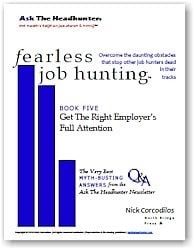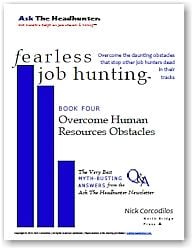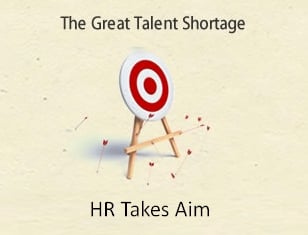In the August 7, 2012 Ask The Headhunter Newsletter, a job hunter wants to why an employer refuses to disclose what the employee benefits are until the offer has been accepted:
I’ve been offered a job by a very large company. The salary is fine and the job sounds good. The offer letter states that I am eligible for benefits, but it doesn’t say what the benefits are.
I asked the headhunter who was working to place me, and he said the company’s policy is not to disclose the benefits until after I’ve accepted the position. This sounds really bizarre. The headhunter has assured me that the benefits package is very good and I shouldn’t worry about it; I’ll be happy with the package.
Should I take his word for it and accept the job, or should I run the other way?
My Advice
You’ve run smack up against one of the most perturbing and ludicrous practices of many companies: They will not divulge the details of their benefits package and/or their employee policy manual until after you have started work.
 Why? Honest, this is the usual answer: “Our benefits package is considered a competitive secret, and our employee manual is confidential.”
Why? Honest, this is the usual answer: “Our benefits package is considered a competitive secret, and our employee manual is confidential.”
You are right to be skeptical.
They invite you to join the game, but you can’t see the rules in advance. You may make an investment in the company, but you may not see the financials. You may buy the house, but you may not do an engineering inspection first.
Did you ever ask to see a menu at a restaurant only to be denied?
Please rest assured, the company you’re dealing with is behaving stupidly. You may be tempted to run away, but don’t. Take some control of the negotiation.
Call the office of the CEO and very politely explain that you are sitting on a job offer that you’re ready to accept, but you have a question no one — including the HR department — seems able to answer to your satisfaction. Decline to say what the question is until a staff member from the CEO’s office (someone who is not in the HR department) agrees to talk with you. I’ll bet you dinner (I’ll even show you the menu) that the CEO’s office has no idea that HR withholds such basic information from potential hires.
If you get to talk with a sensible company representative, here’s How to Say It:
“I’m impressed with your company, and I’m eager to come to work with John Jones, the manager of your finance department [or whichever department]. However, I cannot accept this offer without knowing all the terms of employment. I could no more sign an employment agreement without knowing all the terms than your company could sign a contract without knowing what it was committing to. I’m sure you understand. Could you please send me your employee manual, benefits package, and any other documents that would bind me after I start the job? Once I have these, I will promptly respond. I look forward to accepting your offer, and to making a significant contribution to your business. Please don’t ask me to talk with your HR department — they have already refused to provide these basic documents. I hope I can count on your help so we can all get to work.”
Although I think a company’s refusal to disclose benefits is sufficient reason to decline an offer, I should warn you that the more serious risk lies in taking the job before you’ve seen the employee policy manual. This is where things like non-compete rules, prohibitions against moonlighting, surrender of invention rights, and other important terms are sometimes hidden.
If you balk at these rules after you’ve started the job, your only option is to quit — without the freedom of being able to fall back on your old job. Moreover, be aware that those rules may still apply after you quit. A job offer is a contract, and certain terms of that contract may survive your resignation or termination. Get it all in writing. A company’s employee manual is usually incorporated by reference into a job offer. When you accept one, you accept the other. But don’t stop there: Beware the cause clause.
Be very careful. Question authority. Question such policies. They stink, and there’s good reason to say so. You risk getting the company upset, but as I asked earlier, would you agree to pay for a meal at a restaurant before you know what’s on the menu? (In some European restaurants, they go a step further and graciously invite you into the kitchen where you can see how the food is prepared and check out the bubbling pots for yourself, before you even sit down!)
Not all companies have such policies about benefits information. I discourage you from signing a contract (a job offer) from a company that will not divulge everything you need to know. I’d tell the headhunter you have your own policy: I need to know what the entire offer is — including the benefits.
Have you ever taken a job without knowing the employee benefits? Have you encountered a “gotcha” too late? What else do you need to know before quitting your old job to accept a new offer?
: :









